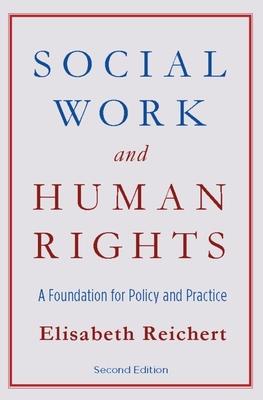Social Work and Human Rights has become a standard text highlighting the role of social work in protecting the rights of vulnerable populations. Through rigorous analysis, classroom exercises, and a frank discussion of the implications for practice both within and outside of the United States, the volume effectively acquaints readers with the political, economic, and social dimensions of rights issues and the documents that guarantee them. New material covers international events, such as the United Nations' Millennium Declaration (2000) and its effort to reduce the poverty and suffering of billions worldwide. The volume now emphasizes cultural rights and includes a probing lesson in cultural relativism. It turns a critical eye toward the failure in the United States to address social welfare issues and its reluctance to rectify policies favoring one group over another.
Praise for the first edition: "A human rights compass--a preliminary guide for the translation of human rights for social workers.... It is to be welcomed."--European Journal of Social Work "Foundation documents provide an essential tool for understanding the issues and applying the understanding to concrete social policy advocacy and action."--Canadian Association of Social Workers Bulletin "This is a text which is overdue for social work students and faculty."--Rosemary Link, coauthor of Human Behavior in a Just World: Reaching for Common Ground "Reichert makes human rights concepts come alive. Practice case examples and human rights analysis of the National Association of Social Worker's Code of Ethics are particularly valuable in orienting the reader to the domestic practice applications of the global human rights movement."--Lynne M. Healy, author of International Social Work: Professional Action in an Interdependent World
Social Work and Human Rights: A Foundation for Policy and Practice
Social Work and Human Rights has become a standard text highlighting the role of social work in protecting the rights of vulnerable populations. Through rigorous analysis, classroom exercises, and a frank discussion of the implications for practice both within and outside of the United States, the volume effectively acquaints readers with the political, economic, and social dimensions of rights issues and the documents that guarantee them. New material covers international events, such as the United Nations' Millennium Declaration (2000) and its effort to reduce the poverty and suffering of billions worldwide. The volume now emphasizes cultural rights and includes a probing lesson in cultural relativism. It turns a critical eye toward the failure in the United States to address social welfare issues and its reluctance to rectify policies favoring one group over another.
Praise for the first edition: "A human rights compass--a preliminary guide for the translation of human rights for social workers.... It is to be welcomed."--European Journal of Social Work "Foundation documents provide an essential tool for understanding the issues and applying the understanding to concrete social policy advocacy and action."--Canadian Association of Social Workers Bulletin "This is a text which is overdue for social work students and faculty."--Rosemary Link, coauthor of Human Behavior in a Just World: Reaching for Common Ground "Reichert makes human rights concepts come alive. Practice case examples and human rights analysis of the National Association of Social Worker's Code of Ethics are particularly valuable in orienting the reader to the domestic practice applications of the global human rights movement."--Lynne M. Healy, author of International Social Work: Professional Action in an Interdependent World